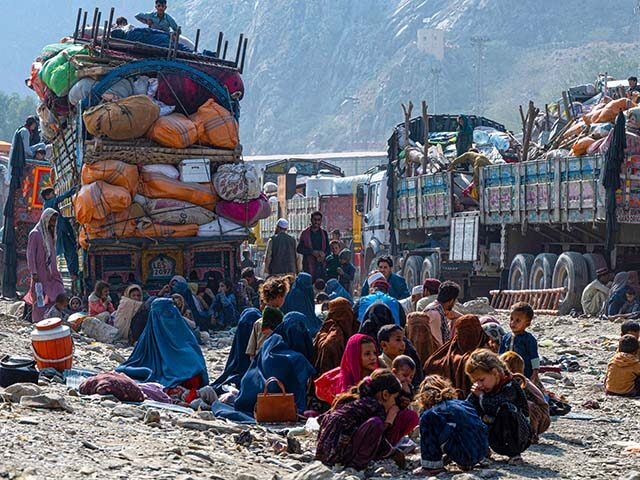November 1 is Pakistan’s deadline for all undocumented migrants to leave the country, or else authorities will forcibly deport them.
Most of those undocumented migrants are Afghans and they seem to have taken the warning seriously. Departures to Afghanistan surged after the warning was given and, on Wednesday reporters described a huge number of trucks and buses loaded with Afghans racing across the border.
Pakistan issued its deportation order at the beginning of October, motivated in part by the security risk posed by the almost two million Afghans living on Pakistani soil.
Pakistani Interior Minister Sarfraz Bugti noted that Afghan nationals were involved in 14 of the 24 suicide bombings conducted in Pakistan so far this year. Pakistan’s biggest security threat is Tehrik-i-Taliban (TTP), the “Pakistani Taliban,” a group with ties to the Afghan Taliban and a similar ideology that calls for replacing the Islamabad government with an Islamic “emirate.”
The tempo and severity of TTP attacks increased substantially after the Taliban conquered Afghanistan in 2021. The Pakistani government has complained TTP militants are increasingly armed with advanced American weapons abandoned in Afghanistan by President Joe Biden.
Human rights groups, migrant groups, and the United Nations objected to Pakistan’s deportation plan, arguing that Afghans forced to return to Taliban-controlled Afghanistan would face poverty and deprivation at best, violence and murder at worst.
The Taliban also objected to the crackdown, calling it “unacceptable” and insisting “Afghan refugees are not involved in Pakistan’s security problems.” Pakistan shot back that mass deportation might not be necessary if the Taliban kept its promises to prevent terrorist attacks from its territory against Pakistan.
Islamabad moved ahead with its program despite these objections, launching a major public relations campaign to ensure every migrant knew about the November 1 deadline, detaining illegal migrants to get the deportation ball rolling, and even offering rewards for tips leading to the apprehension of illegals. Pakistani media reported last week that almost 60,000 Afghan migrants had already been deported.
Thousands of Afghans fled across the border into their home country in a fleet of trucks and buses as the final 24 hours ticked down. Some departing migrants told Sky News their families have been living in Pakistan for generations:
More have headed there today ahead of the deadline, among them Mohammad Amin, who said his father came to Pakistan 40 years ago.
“He died here. My mother also died here and their graves are in Pakistan,” said Mr Amin, originally from Afghanistan’s eastern Nangarhar province.
“We are going back today as we never tried to register ourselves as refugees with the UN refugee agency,” the 52-year-old said.
“We’d live here our whole life if they didn’t send us back,” another migrant said wistfully.
“I am very sad about leaving my house. I can’t express in words the pain I felt leaving it. Our house was made of mud, and we built it ourselves. I planted many trees there. My neighbors and friends were in tears. It’s the cruel government that is making us leave,” a migrant named Abdullah who was transporting 22 of his family members in a rented truck told the BBC.
Abdullah claimed he actually did have a valid ID card provided by the Pakistani government, but they still raided his house, arrested his sons, and told him to leave.
“We have nothing. We didn’t do anything wrong. We used to work as labor and feed the family,” his wife said.
Critics of Pakistan’s policy said the government has been slow to process refugee applications and issue identification cards. The U.N. High Commissioner for Refugees (UNHCR) said Pakistan has promised not to deport refugees with U.N. certifications, or those who would be at high risk of abuse by the Taliban, including women, journalists, and members of ethnic or religious minorities. Pakistan also promised to open refugee centers to provide special attention to children and the elderly.
“We’ve just had the earthquake which is impacting heavily on the situation in Afghanistan, and on top of that, winter is approaching so it’s not the best season to have people going back to a country that is already in a very fragile situation,” said UNHCR representative Philippa Candler.
Pakistani officials wasted no time bulldozing what they described as illegal houses occupied by Afghan migrants.
“If the police come to my door tomorrow, I will plead with them, implore them to let me stay. I cannot go back, but I don’t know how else to convince them to let me stay here,” an Afghan widow with two children told Al Jazeera News on Wednesday.
“Pakistan’s announced deadline for Afghans to return has led to detentions, beatings, and extortion, leaving thousands of Afghans in fear over their future,” Human Rights Watch Afghanistan researcher Fereshta Abbasi told Al Jazeera.

COMMENTS
Please let us know if you're having issues with commenting.